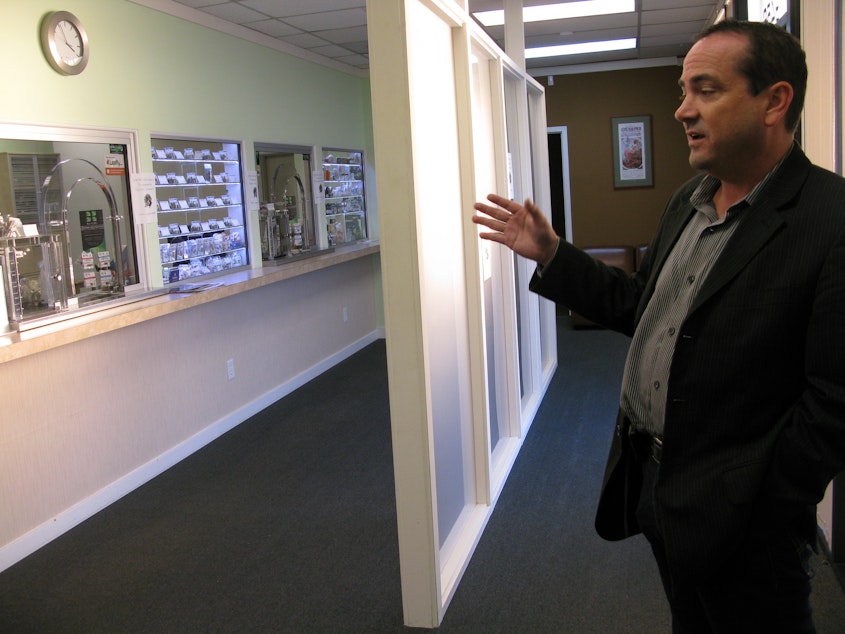Marijuana Banking: Secretive But Poised To Grow

Many marijuana business owners say they have bank accounts, but aren’t completely forthright with their bankers about the nature of their businesses. They claim to be in “consulting” or “medical research.” And they know they could lose those bank accounts suddenly, at any time, since federal law prohibits banks from holding any funds associated with illegal drugs.
Now in the wake of Initiative 502, which legalized marijuana in Washington state, some banks and credit unions may be ready to officially open accounts for marijuana businesses. Numerica, a Spokane Valley-based credit union, has announced it will accept state-licensed businesses as clients.
Seattle attorney Robert McVay with the Canna Law Group said there are more to come.
“Small banks, especially the community banks, are certainly looking into it if only because it’s a new industry and whoever takes that first plunge, whoever takes the risk, is going to get lots and lots and lots of business," McVay said. "We’re working with a couple financial institutions here in the state that are likely going to do this.”
That would be a significant change from current medical marijuana businesses, which have had only tenuous access to bank accounts and have sometimes operated completely in cash.
From Openness To Secrecy
John Davis has been in the marijuana business for several years. He owns a medical marijuana dispensary in West Seattle and is seeking a state retail license. Davis said he’s had a lot of different bank accounts, and a lot of tactics for getting them.
First, he tried openness. “I got approval at the highest level of a banking institution, and they knew exactly what I did, and I walked in with my head held high as cannabis entrepreneur,” he said.
But when that bank’s policy changed toward marijuana businesses, Davis said his account was the first to be closed.
He switched to what he called a “don’t ask, don’t tell institution,” where “the corporate level does not allow for it, however the local managers may not care so much.”
Then the local branch of that bank changed its policy and he lost his account again. His current bank account is in the name of a holding company that gives no clue about his business.
“I hate that I have to be a little cagey and artful when opening up a bank account,” he said.
Since Davis organizes Hempfest and is known for his advocacy work, he never does the banking himself. He offers classes for other aspiring marijuana business owners, where he gives strategies for getting bank accounts.
At his dispensary, he keeps his cash in one safe and his marijuana in another so the money doesn’t pick up the smell. He stocks his own ATM, and his staff helps visitors from behind bullet-proof glass.
Davis said if he lost his current bank account, he would have to pay his employees and vendors in cash. “I built this place like a bank on steroids because I may have to be a bank,” he said.
Banks Keep Their Distance
Davis agrees with U.S. Attorney General Eric Holder, who said in January that the all-cash nature of the marijuana business is a danger to public safety.
Federal agencies then offered guidance clarifying “how financial institutions can provide services to marijuana businesses” in states where marijuana is legal. The answer? Very carefully. Banks will still have to report these businesses to federal regulators.
Mark MacDonald, president of Community Bankers of Washington, said the new federal guidance won’t change things for most banks – because federal authorities can still prosecute them.
“Now there will be some who would say, ‘But they would never do that,’” he said. “But bankers manage risk and they would prefer to have something in writing that would assure them that this will never happen, not somebody saying, ‘Trust me.’”
MacDonald said if banks decide to accept more marijuana businesses as clients, they’ll probably do it quietly. They won’t want to alienate other customers, and they won’t want other marijuana businesses to come running.
“Do you run the risk that all of a sudden you’re inundated with every marijuana business coming to your bank?” he said.
Taking The Plunge
MacDonald said it could be profitable for some banks to specialize in marijuana businesses if they felt more secure.
Congressman Denny Heck of Washington state said he understands bankers’ concerns, and he’s seeking a change in federal law to legalize banking services in states where marijuana is legal. Heck said the federal guidance creates a big opportunity for the first banks that decide to move forward.
“They’re going to benefit in two ways,” Heck said. “They’ll substantially grow their deposits, number one, and number two, they may considering levying a particular surcharge or fee for the additional paperwork that is required; there is nothing prohibiting them from doing that.”
Robert McVay, the attorney, won’t say which financial institutions are looking into providing banking for marijuana businesses. He said those banks will rely on word of mouth within the world of marijuana growers and sellers to attract customers.
But if banks take these risks, he said there are still many details to work out. Like whether any armored car companies would be willing to pick up the cash from marijuana retail stores.
Banks are also looking ahead, to a whole new sector for lucrative business loans. But before they start lending, banks need to know whether they can foreclose on those federally illegal marijuana assets.

